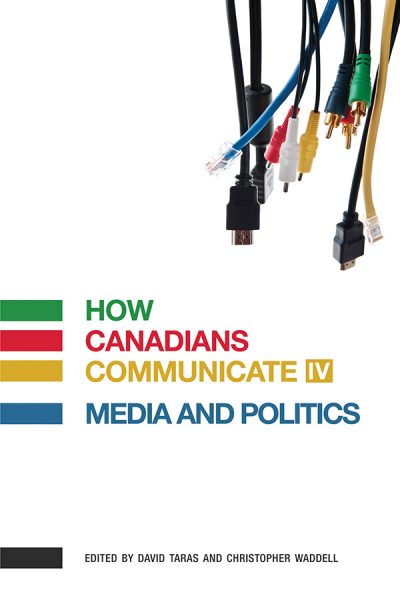Substantial changes have occurred in the nature of political discourse over the past thirty years. Once, traditional media dominated the political landscape, but in recent years Facebook, Twitter, blogs and Blackberrys have emerged as important tools and platforms for political campaigns. While the Canadian party system has proved surprisingly resilient, the rhythms of political life are now very different. A never-ending 24-hour news cycle has resulted in a never-ending political campaign. The implications of this new political style and its impact on political discourse are issues vigorously debated in this new volume of How Canadians Communicate, as is the question on every politician’s mind: How can we draw a generation of digital natives into the current political dialogue?
With contributions from such diverse figures as Elly Alboim, Richard Davis, Tom Flanagan, David Marshall, and Roger Epp, How Canadians Communicate IV is the most comprehensive review of political communication in Canada in over three decades – one that poses questions fundamental to the quality of public life.
About the Author
David Taras holds the Ralph Klein Chair in media studies at Mount Royal University. He served as an expert advisor to the House of Commons Standing Committee on Canadian Heritage and co-edited the first two volumes in the How Canadians Communicate series. He is the co-author of The Last Word: Media Coverage of the Supreme Court of Canada. Christopher Waddell is director of the School of Journalism and Communication at Carleton University and holds the Carty Chair in business and financial journalism. He was formerly national editor for The Globe and Mail and Parliamentary bureau chief for CBC television news.
Reviews
Journalism has fallen on hard times and journalists have neither the incentive nor the resources to maintain the standard of informed independence that once characterized their profession. How Canadians Communicate IV carefully dissects the mutliple causes of this condition and redefines the concept of political communication in Canada.
David Smith, University of Saskatchewan
Table of Contents
- List of Illustrations
- Acknowledgements
- The Past and Future of Political Communication in Canada: An Introduction / David Taras
- Part I. The Changing World of Media and Politics
- 1. The Uncertain Future of the News / Florian Sauvageau
- 2. On the Verge of Total Dysfunction: Government, Media, and Communications / Elly Alboim
- 3. Blogs and Politics / Richard Davis
- 4. The 2011 Federal Election and the Transformation of Canadian Media and Politics / David Taras and Christopher Waddell
- 5. Berry’d Alive: The Media, Technology, and the Death of Political Coverage / Christopher Waddell
- 6. Political Communication and the “Permanent Campaign”/ Tom Flanagan
- 7. Are Negative Ads Positive? Political Advertising and the Permanent Campaign / Jonathan Rose
- 8. E-ttack Politics: Negativity, the Internet, and Canadian Political Parties / Tamara Small
- 9. Myths Communicated by Two Alberta Dynasties / Alvin Finkel
- 10. Throwing the Baby Out with the Bathwater: Canadian Forces News Media Relations and Operational Security / Robert Bergen
- Part II. Citizens and Politics in Everyday Life
- 11. Exceptional Canadians: Biography in the Public Sphere / David Marshall
- 12. Off-Road Democracy: The Politics of Land, Water, and Community in Alberta / Roger Epp
- 13. Two Solitudes, Two Québecs, and the Cinema In-Between / Dominique Perron
- 14. Verbal Smackdown: Charles Adler and Canadian Talk Radio / Shannon Sampert
- 15. Contemporary Canadian Aboriginal Art: Storyworking in the Public Sphere / Troy Patenaude
- 16. Intimate Strangers: The Formal Distance Between Music and Politics in Canada / Richard Sutherland
- Final Thoughts: How Will Canadians Communicate About Politics and the Media in 2015? / Christopher Waddell
- Contributors
- Index
This work is licensed under a Creative Commons License (CC BY-NC-ND 2.5 CA). It may be reproduced for non-commercial purposes, provided that the original author is credited.
